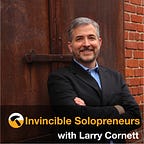During my lifetime, I’ve had thousands of business ideas. I’m not exaggerating. I ran small businesses to earn extra money when I was a kid. I’ve been buying books on business and entrepreneurship since I was a teenager. Even then, in the back of my mind, I knew I would never be happy working for someone else.
However, I spent most of my career doing precisely that: working for someone else. For over two decades, I moved from employer to employer (e.g., IBM, Apple, Ridge Technologies, Adaptec, eBay, Yahoo) and tried to be a good little employee. For the most part, I succeeded. I performed well, got promoted often, and climbed the career ladder to executive roles.
But I was always dissatisfied. I never really enjoyed being told what to do. 😂
I left the corporate world in 2010 and started consulting independently again. I then founded a startup and tried to create a “real business” with a product, employees, investors, a board, and all the bells and whistles.
It failed.
“From the ashes, a fire shall be woken, A light from the shadows shall spring…”
— J.R.R. Tolkien
After a few months of depression, I decided I just couldn’t return to being someone’s employee, so I started a new business about seven years ago. But, after the pain of my startup’s failure, I vowed not to repeat the same mistakes. I would not push another boulder up a hill.
So, what do I mean by that?
Building and operating a new business is already challenging enough. Running a business when you don’t have everything you need to be successful is frequently a recipe for disaster.
I’m sure you’ve seen this happen. How many small businesses and restaurants have you watched launch and operate for a few months (or even a few years) but ultimately fail? I’ve watched five restaurants come and go in the same retail space in my small town over the past seven years.
I often see new business owners and startup founders creating a business that requires much more than they personally can deliver. For example, they need:
Investment or loans.
Talent, knowledge, skills, and experience the founder or owner lacks.
Education or credentials the founder or owner doesn’t have yet.
Employees to deliver the products or services for the customers.
Expensive office or retail space.
Expensive equipment.
They’re pushing a giant boulder up a hill by trying to create a business they can’t even begin to operate by themselves. Now, I won’t say that companies like that never succeed. Of course, they do. Mega corporations abound!
However, I’m not that type of business owner, and I’m not that type of business coach. If your dream is to build a massive corporation that generates billions in revenue, plenty of entrepreneurial resources already exist to support you. I can’t help you with that.
Instead, my mission is to help people like you—if you’re still reading—break free of the 9-5 grind and build a solopreneur lifestyle business to support you and your loved ones. I love simple businesses that let you focus on enjoying your life instead of working hard 24x7.
I want to maximize your odds of success. That means eliminating variables and complexity that will make your life harder and increase your chances of failure.
I remember a conversation with someone who wanted to open a new restaurant. As we talked, I discovered they had zero experience in the restaurant industry!
They had never worked in a restaurant.
They had no connections in the industry.
They didn’t know how to cook for a restaurant.
They wanted to take out a huge loan to build a new one.
They didn’t even know where to begin.
Now, I can’t predict the future, but I had a pretty good sense of how quickly this business would fail. I encouraged them to pursue a business idea closer to their existing talents, strengths, knowledge, and experience.
While my tech startup failed, my other three businesses were (and are) pretty successful. I was able to support my family on just my income from them. We weren’t wealthy, but we were comfortable and happy.
I’ve mentioned them before, but I want to talk about those businesses in the context of this article. My first business offered my design services to software companies. I already had 95% of the skills, experience, and equipment needed to succeed. I had to learn some sales and marketing, but that was about it. I landed my first client in less than a day. That business doubled my annual income from what I had been earning from an earlier employer.
I created my second business in about a week as a potential side hustle after I quit my corporate job in 2010. Again, I had about 98% of the skills, experience, and connections I needed to succeed. This time, I deliberately avoided a production job requiring me to create deliverables (e.g., design work). I was selling my knowledge as a consultant and advisor. I immediately landed a part-time client with a retained engagement of $10K/month.
I built my third business in about two weeks after I shut my startup down. I’ve been running this business for almost seven years now. This time, I had about 99% of what I needed to succeed. I intentionally designed my solopreneur business to require no employees, special equipment or software, or a physical location. I can—and have—run this business from anywhere in the world from my phone and laptop. It gives me the ultimate freedom to live life on my terms.
Unless you have ambitions to be the next Amazon or Google, I encourage you to be realistic and build a business that you can operate successfully with low risk from day one. Don’t try to push a boulder up a hill and set yourself up for failure.
I’m Larry Cornett, a coach who can work with you 1-on-1 to design, launch, and optimize your business. You might also be interested in my “Employee to Solopreneur” workshop. I live in Northern California near Lake Tahoe with my wife and Great Dane while running my businesses 100% remotely.












